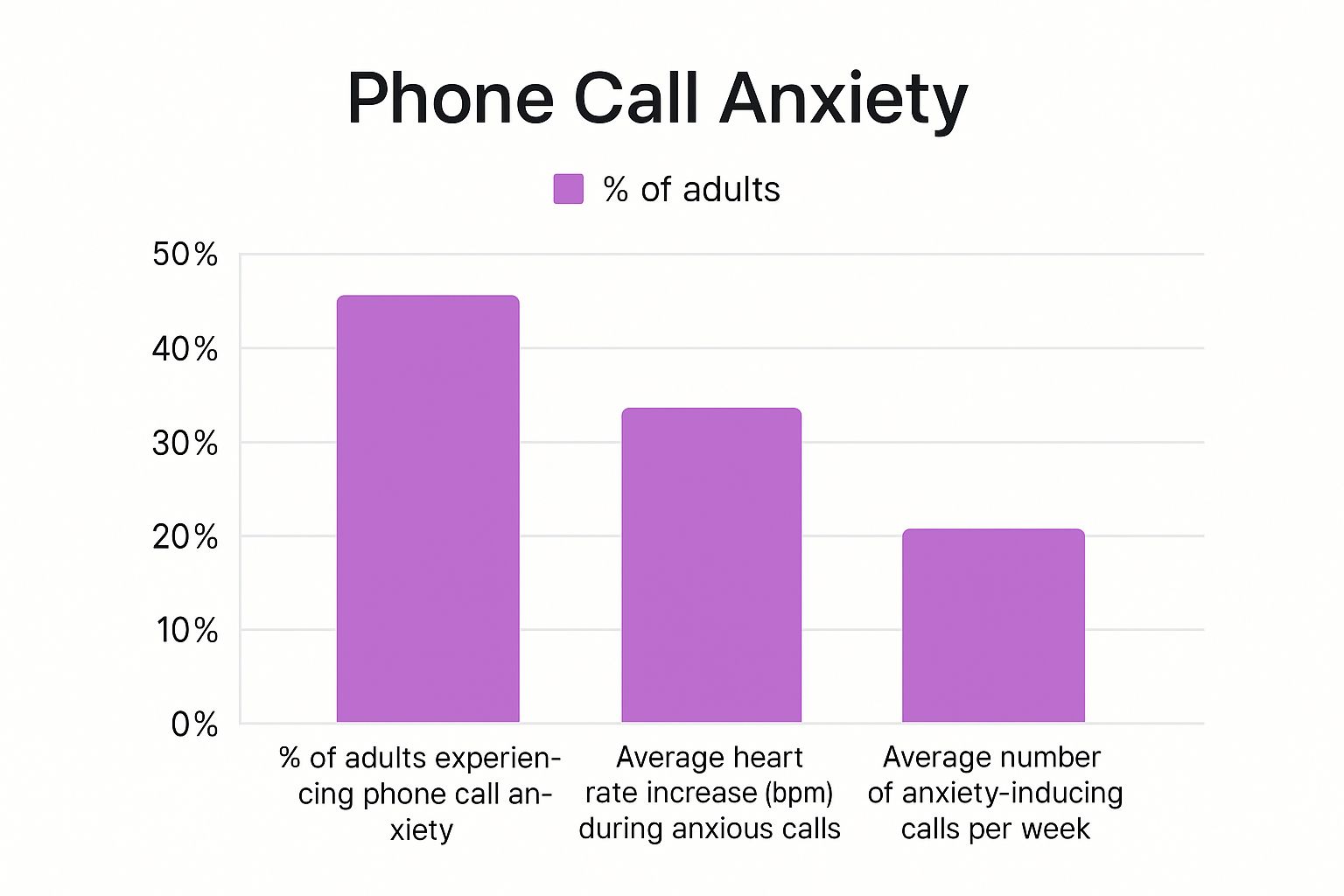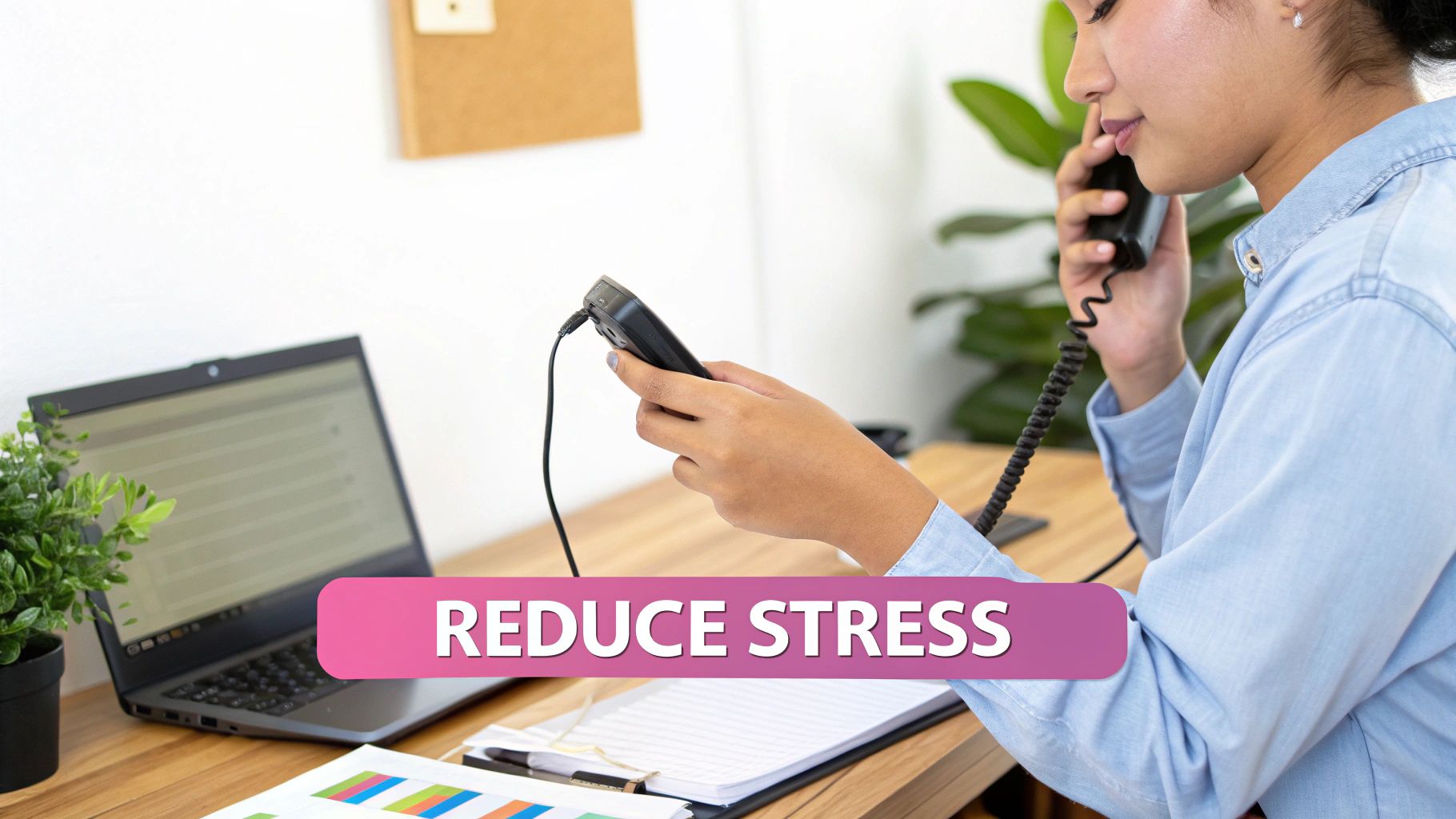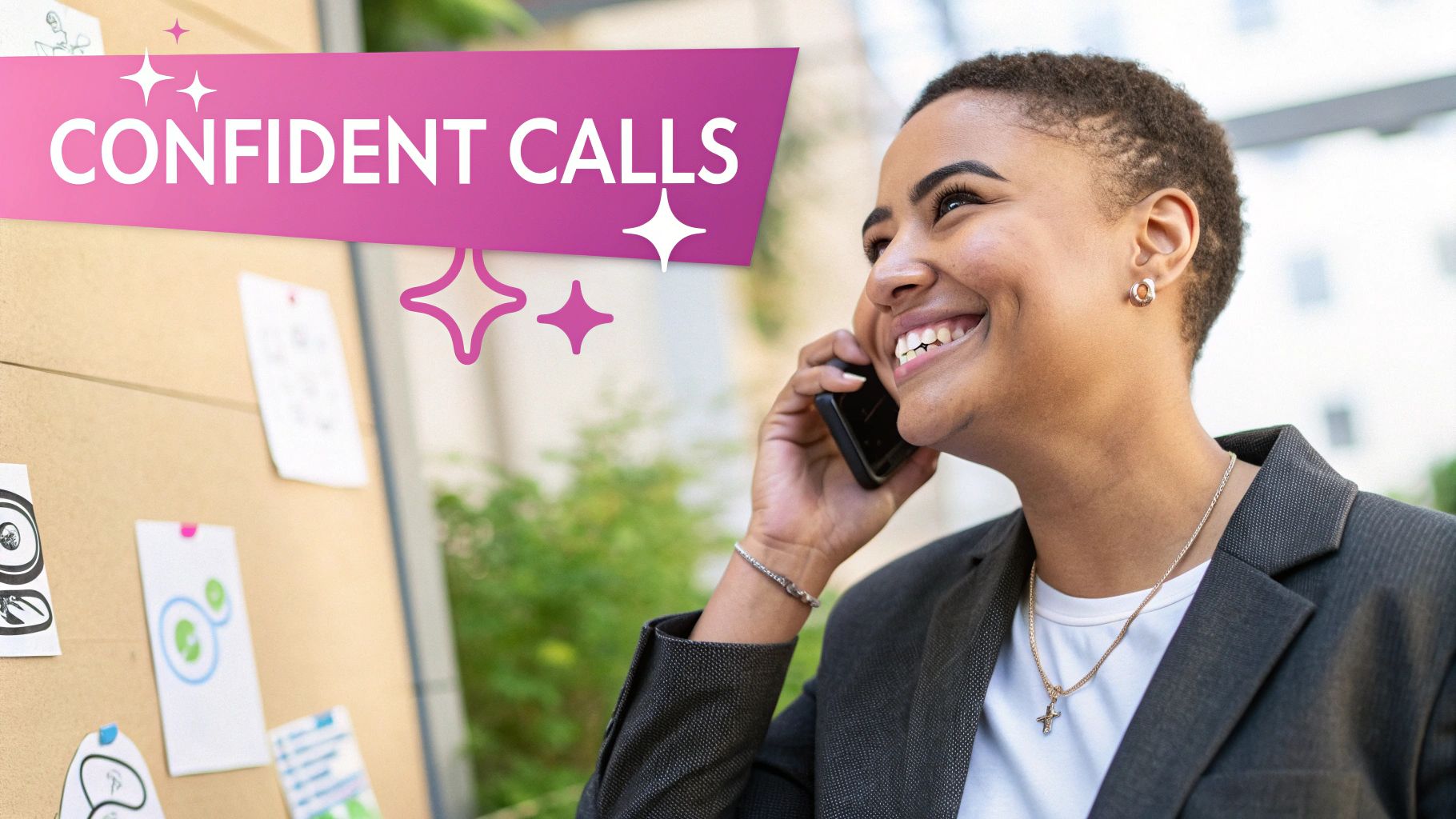Conquer Your Phone Call Anxiety
That gut-wrenching dread you feel when your phone rings? You’re not alone. It’s a real thing millions of us experience.
This feeling has a name: phone call anxiety, sometimes called telephobia. And no, it's not just a simple preference for texting. It’s a genuine source of stress that can mess with your personal life and even hold you back at work.
Why That Ringtone Feels So Overwhelming
For a lot of people, the sound of a phone ringing is an instant trigger for the body's stress response. It's a specific type of social anxiety that zeroes in on live phone conversations. It can show up in a bunch of ways, turning even a quick call into what feels like a massive hurdle.
Maybe you find yourself pacing around, rehearsing what you're going to say. Or maybe you just put off making important calls for days. Some people even feel their heart pound just thinking about picking up.
This is way more common than you’d think, and it hits people from all walks of life. The pressure to come up with the right words in real-time, without being able to see someone's facial expressions or body language, creates a uniquely awkward and high-stakes situation.
What Does Phone Call Anxiety Look Like?
Figuring out the signs is the first step to getting a handle on them. Phone call anxiety isn't just in your head; it often shows up with real physical and behavioral changes.
To help you pinpoint what's going on, here’s a quick breakdown of the common signs you might be experiencing.
Identifying the Signs of Phone Call Anxiety
| Symptom Category | Common Signs and Experiences | | --- | --- | | Emotional | An intense wave of worry about what to say, a deep fear of being judged for stumbling over words, or an overwhelming sense of dread when the phone rings. | | Physical | A racing heartbeat, feeling short of breath, sweaty palms, or even shaky hands right before or during a call. | | Behavioral | Actively ignoring calls and letting them go to voicemail, making excuses to use text or email instead, or ending calls as quickly as possible. |
Recognizing any of these? It’s completely normal. These symptoms exist on a spectrum, and what feels like minor nerves for one person can be a debilitating fear for another.
Research actually shows that phone call anxiety affects a huge chunk of the population. One study found the overall prevalence of telephobia to be 42%. That breaks down into 33% with mild anxiety, 7.67% with moderate, and 1.33% with severe cases.
The data below gives you a clearer picture of just how widespread this is and how it physically impacts people.

The numbers don't lie. A massive percentage of adults get this anxiety, and it often comes with a very real, measurable spike in heart rate.
The most important takeaway here is that you are definitely not alone in this. Once you understand that, you can start exploring the right strategies and modern tools—like AI-powered assistants from Ghosty—that can help you take back control and build your confidence one call at a time.
Why Phone Calls Feel So Intimidating

To really get a handle on phone call anxiety, we need to pull back the curtain and see why a simple conversation can feel more like a high-stakes performance. It's not just a random dislike; there are specific psychological triggers that make phone calls uniquely challenging compared to chatting in person or over text.
One of the biggest culprits is the intense, real-time pressure. When you're on a call, you're on a live stage. There's an unspoken rule that you have to respond instantly and sound smart doing it, with none of the usual pauses you'd get when crafting an email or text.
That pressure feeds a powerful fear of being judged. Every stammer, every awkward silence, every fumbled word feels like it's under a microscope. You can't see the other person's face to know if they're nodding along or silently rolling their eyes, which lets your mind spiral into all sorts of worst-case scenarios.
The Problem of Missing Information
In a normal conversation, we lean heavily on non-verbal cues—facial expressions, hand gestures, and body language are huge. In fact, research shows a massive chunk of our communication is non-verbal. Phone calls? They strip all of that away, leaving you with just words and tone of voice.
This creates a massive conversational void. Imagine trying to follow a story with a blindfold on; you’re missing half the picture. Your brain, in an attempt to fill in those gaps, often defaults to the worst possible interpretation.
That brief silence on the other end isn't just a pause. To your anxious mind, it can feel like disapproval, confusion, or boredom. This isn't a personal failing; it's a logical, self-protective response to having incomplete information.
Without any visual feedback, it’s tough to gauge reactions, build rapport, or even figure out when it’s your turn to speak. A simple chat turns into a tricky navigation exercise.
The Disruption of Unexpected Calls
Another major trigger is just how intrusive an unexpected call can be. That sudden ringtone can feel like an ambush, demanding your immediate attention and completely derailing your focus. This abrupt demand to switch gears and "be social" can be incredibly jarring.
At its core, this feeling comes from a loss of control. You didn't choose the time, you didn't choose the topic, and now you have to perform on someone else's terms. It’s no wonder this can kick off a fight-or-flight response, making you want to just ignore the call and make it go away.
So, let's break down the key psychological drivers at play:
- Performance Pressure: The on-the-spot need to sound articulate and confident with zero prep time.
- Fear of Judgment: Worrying about how you're coming across without the comfort of seeing positive body language.
- Lack of Non-Verbal Cues: The absence of facial expressions creates ambiguity and invites your brain to assume the worst.
- Intrusiveness: An unexpected call hijacks your attention and messes with your sense of personal control.
Once you recognize these root causes, you can start seeing your phone anxiety for what it is—not an irrational fear, but a completely understandable reaction to a communication style that is, by its very nature, demanding. Shifting your perspective like this is the first real step toward getting your confidence back.
The Generational Shift in Communication
[Content type 'embed' not supported]
If you’d rather get a text than an unexpected phone call, you're not just being difficult. You’re part of a massive cultural shift that has totally rewired how we communicate.
This generational divide is key to understanding where modern phone call anxiety comes from.
For older generations who grew up with landlines, the phone was the way to connect instantly. It was normal. Expected. Often, it was the only option for a quick chat. Phone calls were casual, frequent, and just a standard part of everyday social life.
But for digital natives like Millennials and Gen Z, the world looks completely different. We grew up with text messages, DMs, and social media, and that has fundamentally changed the rules. These text-based methods offer a level of control and predictability that a live phone call just can't touch.
The Rise of Asynchronous Communication
Today, asynchronous communication is the default setting for most of us. You know the drill: you send a message, and the other person responds whenever they’re ready. No pressure.
This gives you time to think, craft a perfect reply, and avoid the deer-in-the-headlights feeling of an on-the-spot question.
This shift has unintentionally turned the good old phone call into a formal, high-stakes event. An unexpected ring can feel intrusive, almost demanding, because it breaks this new social contract. It forces you into a real-time performance that younger generations just haven't had to practice.
A phone call is no longer just a casual chat. For many, it now signals either an emergency or a very formal request. This reframing is a major contributor to the anxiety so many of us feel when our phone rings out of the blue.
This isn't just a feeling; the numbers back it up. A UK survey shows just how differently we all experience phone calls. The study found that a staggering 76% of millennials get anxious thoughts when their phone rings, compared to just 40% of baby boomers.
What happens next is just as telling. A full 61% of millennials will flat-out avoid the call, while only 42% of baby boomers would do the same. You can read the full findings on generational phone anxiety to see the detailed breakdown for yourself.
Seeing this context is incredibly validating. Your anxiety isn't some personal failing. It’s a completely logical response to a world where the rules of communication have been completely rewritten. Recognizing you’re part of a bigger trend is the first step toward normalizing how you feel and finding ways to manage it.
Practical Strategies to Reduce Call Anxiety

Knowing why you have phone call anxiety is the first step, but having a practical toolkit to manage it is how you really start to take back control. The good news? There are simple, real-world strategies you can use that make a huge difference.
These techniques are all about feeling more prepared and in control before, during, and after a call. It’s not about becoming a different person overnight; it’s about turning a dreaded task into something you can absolutely handle.
Prepare for Success Before You Dial
One of the best ways to fight anxiety is to get rid of the unknown. A little bit of prep work can go a surprisingly long way in making you feel ready for anything.
Before your next call, just try creating a simple outline. This isn’t about writing a full-blown script. It’s more about jotting down a few key talking points or questions you need to ask. Having that little guide in front of you can stop your mind from going completely blank under pressure.
Another great trick is to anticipate what the other person might ask you. Spend a couple of minutes thinking about potential questions and how you might answer them. This mental rehearsal makes you feel far more equipped to navigate the conversation as it happens. If you’re worried about getting ambushed by spammers, you might want to look into how to stop unwanted calls to cut down on those interruptions.
Think of it like this: You wouldn't walk into a big presentation without notes. Treat important phone calls the same way. This small act of preparation shifts your mindset from reactive to proactive.
Use Grounding Techniques in the Moment
So your heart starts pounding the second before you hit "dial." That’s your body’s physical stress response kicking in, and you can absolutely calm it down with some in-the-moment techniques. These are quick, discreet exercises you can do anywhere.
One of the simplest is deep breathing. Give the 4-7-8 technique a shot: breathe in slowly for four seconds, hold that breath for seven seconds, and then exhale completely for eight. Repeating this just a few times can slow your heart rate and send a signal to your nervous system that you're safe.
Another powerful tool is what’s called cognitive reframing. This is just a fancy way of saying you actively challenge the negative thoughts that are fueling your anxiety.
- Instead of thinking: "I'm going to stumble over my words and sound foolish."
- Try reframing it to: "I am prepared for this call, and it’s okay if I pause to think. It's a conversation, not a performance."
That small but consistent shift in your self-talk can completely change your emotional state.
Build Confidence with Gradual Exposure
Ultimately, the best way to get over a fear is to face it—but you don’t have to dive into the deep end. Gradual exposure is a proven strategy that’s all about starting small and building momentum.
Begin with low-stakes calls that have a clear, simple purpose. Think of them as practice rounds. Here are a few ideas to get you started:
- Call a local store to ask about their hours.
- Make a dinner reservation over the phone.
- Inquire about a product at a retail shop.
These calls are short, to the point, and have almost zero social pressure. Every single successful call, no matter how tiny, acts as a building block for your confidence. Over time, you’ll find that what once felt impossible is now just another task you can handle with ease.
Using Modern Tech to Ease Phone Conversations
It’s ironic, isn't it? The very same technology that helped fuel our modern communication anxieties might also hold the key to solving them. Instead of seeing your phone as the source of your stress, it’s time to reframe it as a powerful tool that can help you get back in control.
Modern apps can act like a supportive co-pilot, sitting beside you to help navigate those stressful calls with way more confidence. They’re built to tackle the core triggers of phone call anxiety head-on, giving you a safety net so you can focus on the conversation, not the fear.
How Technology Acts as a Supportive Bridge
Think of these tools less like a long-term crutch and more like training wheels. They offer stability and support while you build up the skills and confidence to eventually handle calls all on your own. By taking the pressure off in the moment, they make it so much easier to practice and chip away at that anxiety.
One of the biggest game-changers is real-time speech-to-text transcription. If you've ever felt totally overwhelmed trying to listen, process what's being said, and remember it all at once, this is for you. Seeing the words pop up on your screen turns an auditory challenge into a visual one, which can seriously lower your mental load and keep you locked in.
Another lifesaver is the use of AI to help manage calls. We’ve all been there—your mind goes completely blank and you have no idea what to say next. AI assistants can help screen calls or provide context, preventing those awkward silences that only make anxiety worse.
The real goal of this technology is empowerment. It provides a scaffold that lets you engage in more real-world conversations, building your confidence one successful call at a time until you don't even need the extra support.
The Link Between Digital Dependency and Tech Solutions
Our deep attachment to our smartphones is a double-edged sword. Our reliance on texting and digital messaging is tangled up with the rise of phone call anxiety. In fact, broader studies on nomophobia—the fear of being without a mobile phone—report a global prevalence of around 70.76% for moderate to severe cases. This shows a massive digital dependency that makes spontaneous, direct conversations feel even more jarring. You can discover more insights about mobile phone dependence and mental health to get the full picture.
Since our digital habits are part of the problem, it only makes sense that smartly designed tech can also be part of the solution. Apps like Ghosty lean into this by offering features that bridge the gap between our comfort with texting and the reality of a live conversation.
For instance, being able to screen a call and see a live transcript before you even answer hands the control right back to you. That feeling of control is often the first thing to disappear when anxiety kicks in.
This approach is especially critical when you look at how different operating systems handle call management. While standard features offer some basic functions, they often miss the personal touch needed to truly soothe anxiety. You can explore a deeper dive into what Apple's iOS call screening missed in personalization to see how specialized tools are filling a massive need.
By using these technologies strategically, you can start to transform your phone from a source of dread into a true ally on your journey to confident communication.
Your Questions About Phone Anxiety Answered

As you start to get a handle on this whole phone call thing, it's totally normal for more questions to pop up. Honestly, understanding the ins and outs of phone call anxiety is half the battle.
So, let's tackle some of the most common questions head-on. No fluff, just clear, direct answers to help you keep moving forward.
Is Phone Call Anxiety a Real Medical Condition?
Yes, it absolutely is. What you're feeling isn't just a quirk—it's a recognized issue. Mental health professionals often refer to it as telephobia, and it's considered a specific type of social anxiety disorder.
While you won't find "telephobia" as its own standalone diagnosis in the DSM-5 (the big book of mental health conditions), it falls squarely under the umbrella of social phobia. It’s defined by a persistent, intense fear of phone conversations that leads to serious distress and avoidance.
This is way more than just preferring to text. For many people, it’s a genuine fear that gets in the way of work, relationships, and even basic tasks like making a doctor's appointment. If it feels like it’s taking over, talking to a therapist about something like Cognitive Behavioral Therapy (CBT) can be a game-changer.
How Can I Handle Unexpected Business Calls Without Panicking?
The secret to handling those surprise calls is taking back control. And the most powerful thing you can do is remember this: you don't have to answer right away.
Letting an unknown number go to voicemail is your first line of defense. It gives you a moment to just breathe. You can listen to the message on your own time, figure out what they want, and prep your response without the pressure of a live conversation.
If you feel like you do need to pick up, have a go-to phrase ready. Seriously, it’s a lifesaver.
Try saying something simple like, "Hi, this is [Your Name]. I'm in the middle of something right now, could I call you back in five minutes?" This little script buys you precious time to reset and gather your thoughts.